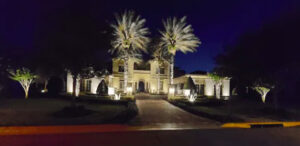How to Keep Your Landscape Lighting Functional in Winter
Orlando Landscape Lighting adds more usable space to your yard, creates a warm and inviting ambiance for entertaining guests, and increases safety. But how do you keep your outdoor lights functioning in winter when snow and ice can cover them? Instead of using line voltage (120v), opt for a low-voltage system that allows you to safely bury the wiring under a few inches of soil or mulch.
Many homeowners are wary of installing landscape lighting because it requires additional electrical wiring and can pose a safety risk to their families. However, a qualified lighting design and installation team can minimize these risks by using low voltage wiring, ensuring that all exposed wires are properly covered with protective materials, and routine maintenance to prevent moisture build-up.
Properly placed landscape lights increase the visual appeal of your home at night and provide safety benefits for guests and visitors. Illuminating potential tripping hazards, like stairs or pathways, makes them visible and reduces the risk of accidents. Additionally, lighting up walkways and driveways allows people to navigate your property without tripping over obstacles or slipping on ice.
Similarly, outdoor lighting can help deter unwanted visitors by illuminating areas where wildlife might roam at night. For example, flood lights can be installed on a deck or patio to prevent unwanted critters from being attracted to the area. Additionally, strategically placed recessed lights can illuminate stairwells and other dangerous spots that are often ignored.
A well-lit exterior is also great for preventing burglars and vandals by making it more difficult for them to hide or escape from a property. For added security, a professionally designed lighting system can include motion sensors or timers to turn the lights on and off at specific times of day or night.
Another reason it’s important to invest in a professional landscape lighting design and installation is that the quality of fixtures will have a major impact on the longevity of your investment. Cheaper options that use battery or solar power may look cheaper up front, but they will quickly wear out and have to be replaced, whereas high-quality LED fixtures will last for years with minimal maintenance.
Finally, landscape lighting can also brighten up architectural features like brick or stonework and showcase trees, fountains, flagpoles, and other permanent structures. A talented designer can produce a look that mimics natural sunlight with subtle shadowing and depth. This style is often used in homes and businesses to highlight their architectural details so that it doesn’t overpower the space.
Landscape lighting can help you showcase the beauty of your home and property. It can highlight your hardscaping and plant materials, create shadows and contrast, and draw attention to focal points like fountains, ponds, patios, pergolas, and other architectural features of the yard or garden. It also can transform the entrance to your home, making it welcoming and intriguing at night.
There are many different landscape lights, and the choice is often based on personal style and how the light will be used. Spotlights, for example, come in various shapes and sizes and can be used to uplift trees or illuminate decorative sculptures. On the other hand, floodlights are great for illuminating large areas and are commonly used as driveway or patio lighting. Path lights are useful for highlighting walkways and other low areas. They can also be incorporated into steps or wall sconces.
Your landscape lighting designer will work with you to develop a lighting plan highlighting the most important aspects of your property at night. The process usually starts with a meeting where you and your designer will walk the property. During this walk, the designer will peruse your list of needs and wants for the lighting system. They will also look at the current lighting setup and discuss how to improve it.
When the installation is complete, your landscape lighting specialist will meet with you again for a walkthrough. They will discuss the overall lighting scheme and make any necessary adjustments to ensure safety, security, and ambiance. Depending on your preferences, they may suggest some new fixtures.
One of the most important things to keep in mind when implementing a landscape lighting system is the concept of depth. This is achieved by utilizing illumination that draws the eye inward and gives the viewer a sense of involvement with the world around them. It is achieved by selectively illuminating items and areas close to and far away from the viewer. This is a very challenging aspect of landscape lighting and requires the skills of a professional.
Landscape lighting increases the functionality of your home’s outdoor spaces. It enables you to enjoy your yard more after dark and makes it possible for guests to navigate your property safely. In addition, it creates a sense of security by illuminating potential hazards such as stairs and pathways.
One of the most important factors to consider during landscape lighting planning is how and when you plan on using your outdoor space. This will help guide your selection of light fixtures and will ultimately determine where they should be installed. For instance, a walkway or deck is better lit with path lights illuminating the ground, while spotlights or floodlights accent specific plants or features in your garden.
The brightness or lumens of the lighting you choose is also a factor. While higher-quality fixtures may cost more upfront, they will last longer and require less maintenance. Additionally, intelligent systems offer customizable schedules and color options that can be changed to fit different occasions or moods.
In terms of maintenance, consider the power source for your lighting. Solar-powered systems draw power from the sun and require minimal maintenance besides occasional cleaning. Other options include integrated fixtures with an LED board built into them and are therefore “lamp-ready,” meaning that when a bulb goes out, you can simply replace it rather than install a new fixture.
The most common lighting materials are copper or brass, which are durable and attractive. These fixtures will develop a natural patina over time and are resistant to corrosion. Other material choices include cast aluminum, which is more affordable but is susceptible to rust and requires periodic painting or staining to protect it from the elements. However, some manufacturers produce high-quality composites that can withstand the elements and look similar to solid metal fixtures without the higher price tag.
Lighting fixtures are exposed to sun, rain, dirt, and other debris daily. Over time, these elements can cause damage that ruins the look of your lights or even makes them fail altogether. Some of these problems are easy to diagnose and fix, but others require the help of a professional.
One of the most common problems is dim or inconsistent landscape lighting. Several things, including bad connections or voltage drops, can cause this. The latter can happen when the wires are improperly sized and run too far from the transformer. A qualified lighting expert can inspect your system and ensure the wires are sized correctly.
Another issue is bulbs that are burned out. Having the right bulbs in your lighting system is important so you get the best light quality and function for your money. Using generic or inferior bulbs can damage your lighting system.
Sometimes, it is difficult to tell when a bulb is burned out, but we recommend that your lighting professional come out and inspect your lighting completely. They can also help you find the best replacements.
Wiring issues are another problem that can affect landscape lighting. This is particularly true if you need an experienced lighting professional to install your system. Electrical components should only be worked on by professionals who are experienced in working with them.
Finally, lighting issues can be caused by things such as a blown fuse, or they could be due to an overloaded circuit. If your lighting is not functioning as it should, it is always a good idea to start by checking your circuit breaker.
Finally, keeping your outdoor lighting system clear of snow and debris is a good idea. This will prevent it from being blocked by the elements and keep your lighting looking great for years. As with any other aspect of your home, regular maintenance can save you a lot of time and hassle in the long run.

